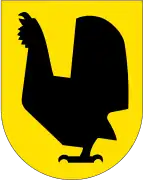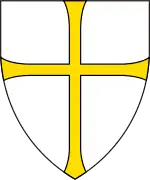Malvik
Malvik is a municipality in Trøndelag county, Norway. It is part of the Trondheim Region. The administrative center of the municipality is the village of Hommelvik. Other villages in Malvik include Muruvika, Smiskaret, Sneisen, Vikhammer, and Hundhammeren.
Malvik kommune | |
|---|---|
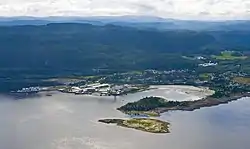 View of Muruvik in Malvik | |
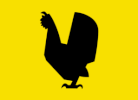 Flag 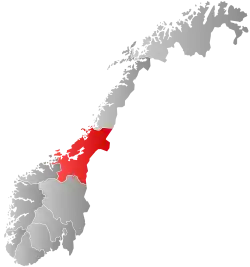 Trøndelag within Norway | |
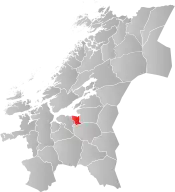 Malvik within Trøndelag | |
| Coordinates: 63°22′22″N 10°45′03″E | |
| Country | Norway |
| County | Trøndelag |
| District | Trondheim Region |
| Established | 1891 |
| • Preceded by | Strinda Municipality |
| Administrative centre | Hommelvik |
| Government | |
| • Mayor (2019) | Trond Hoseth (Ap) |
| Area | |
| • Total | 168.44 km2 (65.04 sq mi) |
| • Land | 161.87 km2 (62.50 sq mi) |
| • Water | 6.57 km2 (2.54 sq mi) 3.9% |
| • Rank | #313 in Norway |
| Population (2022) | |
| • Total | 14,425 |
| • Rank | #85 in Norway |
| • Density | 89.1/km2 (231/sq mi) |
| • Change (10 years) | |
| Demonym | Malvikbygg[1] |
| Official language | |
| • Norwegian form | Bokmål |
| Time zone | UTC+01:00 (CET) |
| • Summer (DST) | UTC+02:00 (CEST) |
| ISO 3166 code | NO-5031 |
| Website | Official website |
While "Malvik" refers to the municipality as a whole, it also refers to the urban area of Malvik. The villages of Hundhammeren, Vikhammer, Saksvik (all in Malvik), and Væretrøa (in Trondheim) together form an urban area that is also called Malvik. The 2.63-square-kilometre (650-acre) urban area has a population (2017) of 6,949 which gives the area a population density of 2,642 inhabitants per square kilometre (6,840/sq mi).[3] This area is the most populous urban area in the municipality.[4]
The 168-square-kilometre (65 sq mi) municipality is the 313th largest by area out of the 356 municipalities in Norway. Malvik is the 85th most populous municipality in Norway with a population of 14,425 The municipality's population density is 89.1 inhabitants per square kilometre (231/sq mi) and its population has increased by 12.8% over the previous 10-year period.[5][6]
General information
The municipality of Malvik was established in 1891 when it was separated from the large municipality of Strinda. On 1 January 1914, a small area of the neighboring municipality of Lånke (population: 38) was transferred to Malvik. On 1 July 1953, a small area of Malvik (population: 37) was transferred to the neighboring municipality of Strinda.[7] On 1 January 2018, the municipality switched from the old Sør-Trøndelag county to the new Trøndelag county.
Name
The municipality (originally the parish) is named after the old Malvik farm (Old Norse: Manvík) since the first Malvik Church was built there. The first element is mǫn (stem form man-) which means "mane", referring to a mountain ridge behind the farm. (Mana which means "the mane" is a common name for many mountains in Norway, where the form of the mountain is compared with the mane of a horse.) The last element is vík which means "inlet".[8]
Coat of arms
The coat of arms was granted on 23 July 1982. The official blazon is "Or, a grouse close sable" (Norwegian: I gull en svart tiur). This means the arms have a field (background) that has a tincture of Or which means it is commonly colored yellow, but if it is made out of metal, then gold is used. The charge is a western capercaillie, a local type of grouse and one of the largest of the local forest birds in the area. The design was chosen to symbolize the rich nature in the area. The arms were designed by Stein Davidsen after an idea by Lorentz Svingen.[9][10][11]
Churches
The Church of Norway has two parishes (sokn) within the municipality of Malvik. It is part of the Stjørdal prosti (deanery) in the Diocese of Nidaros.
| Parish (sokn) | Church name | Location of the church | Year built |
|---|---|---|---|
| Hommelvik | Hommelvik Church | Hommelvik | 1886 |
| Mostadmark Chapel | Sneisen | 1986 | |
| Malvik | Malvik Church | Malvik | 1846 |
Geography
Malvik is just to the east of the city of Trondheim, one of Norway's largest cities. Many people in Malvik have their place of employment in Trondheim, though there is some local industry in Malvik itself.
The northern part of Malvik lies along the Trondheimsfjord, and it is along this coastal section that the vast majority of the population lives, and where schools, and places of employment are located. The municipal center is Hommelvik, situated about 25 kilometres (16 mi) east of Trondheim, and it has long been the main population area in Malvik. In the last few decades the area around Vikhammer and Hundhammeren (about 10 kilometres or 6.2 miles to the west) has grown larger than Hommelvik. The area has many new housing areas, businesses, and shopping. Collectively, the new area is referred to as the Malvik urban area.[12]
The southern part of the municipality consists mostly of farming and forest areas, with many attractive areas for hiking and cross-country skiing. The Homla river runs north to the Trondheimsfjord. The lake Jonsvatnet lies on the western border of the municipality.
In the southeastern part of Malvik there is the Jøsås exclaves. Three farmsteads, Øvre Jøsås, Store Jøsås, and Lille Jøsås belonging to Malvik municipality are exclaved inside Stjørdal municipality in two different exclaves. Øvre Jøsås and Store Jøsås are located in one exclave (the western one) while Lille Jøsås is making another exclave (the eastern one). The exclaves only have road access to Malvik municipality even though they are inside Stjørdal's borders. The distance between the two exclaves is very small, only about 8 metres (26 ft) at the nearest.[13]
Government
All municipalities in Norway, including Malvik, are responsible for primary education (through 10th grade), outpatient health services, senior citizen services, unemployment and other social services, zoning, economic development, and municipal roads. The municipality is governed by a municipal council of elected representatives, which in turn elect a mayor.[14] The municipality falls under the Trøndelag District Court and the Frostating Court of Appeal.
Municipal council
The municipal council (Kommunestyre) of Malvik is made up of 31 representatives that are elected to four year terms. The party breakdown of the council is as follows:
| Party Name (in Norwegian) | Number of representatives | |
|---|---|---|
| Labour Party (Arbeiderpartiet) | 11 | |
| Progress Party (Fremskrittspartiet) | 2 | |
| Green Party (Miljøpartiet De Grønne) | 2 | |
| Conservative Party (Høyre) | 5 | |
| Pensioners' Party (Pensjonistpartiet) | 1 | |
| Red Party (Rødt) | 1 | |
| Centre Party (Senterpartiet) | 6 | |
| Socialist Left Party (Sosialistisk Venstreparti) | 2 | |
| Liberal Party (Venstre) | 1 | |
| Total number of members: | 31 | |
| Party Name (in Norwegian) | Number of representatives | |
|---|---|---|
| Labour Party (Arbeiderpartiet) | 12 | |
| Progress Party (Fremskrittspartiet) | 3 | |
| Green Party (Miljøpartiet De Grønne) | 2 | |
| Conservative Party (Høyre) | 5 | |
| Christian Democratic Party (Kristelig Folkeparti) | 1 | |
| Pensioners' Party (Pensjonistpartiet) | 1 | |
| Centre Party (Senterpartiet) | 3 | |
| Socialist Left Party (Sosialistisk Venstreparti) | 1 | |
| Liberal Party (Venstre) | 2 | |
| Focus Malvik (Fokus Malvik) | 1 | |
| Total number of members: | 31 | |
| Party Name (in Norwegian) | Number of representatives | |
|---|---|---|
| Labour Party (Arbeiderpartiet) | 13 | |
| Progress Party (Fremskrittspartiet) | 3 | |
| Conservative Party (Høyre) | 8 | |
| Christian Democratic Party (Kristelig Folkeparti) | 1 | |
| Centre Party (Senterpartiet) | 2 | |
| Socialist Left Party (Sosialistisk Venstreparti) | 2 | |
| Liberal Party (Venstre) | 2 | |
| Total number of members: | 31 | |
| Party Name (in Norwegian) | Number of representatives | |
|---|---|---|
| Labour Party (Arbeiderpartiet) | 13 | |
| Progress Party (Fremskrittspartiet) | 5 | |
| Conservative Party (Høyre) | 6 | |
| Centre Party (Senterpartiet) | 2 | |
| Socialist Left Party (Sosialistisk Venstreparti) | 2 | |
| Liberal Party (Venstre) | 1 | |
| Malvik List (Malviklista) | 2 | |
| Total number of members: | 31 | |
| Party Name (in Norwegian) | Number of representatives | |
|---|---|---|
| Labour Party (Arbeiderpartiet) | 9 | |
| Progress Party (Fremskrittspartiet) | 6 | |
| Conservative Party (Høyre) | 7 | |
| Socialist Left Party (Sosialistisk Venstreparti) | 5 | |
| Joint list of the Centre Party (Senterpartiet), Christian Democratic Party (Kristelig Folkeparti), and Liberal Party (Venstre) | 4 | |
| Total number of members: | 31 | |
| Party Name (in Norwegian) | Number of representatives | |
|---|---|---|
| Labour Party (Arbeiderpartiet) | 14 | |
| Progress Party (Fremskrittspartiet) | 4 | |
| Centre Party (Senterpartiet) | 1 | |
| Socialist Left Party (Sosialistisk Venstreparti) | 3 | |
| Joint list of the Conservative Party (Høyre), Christian Democratic Party (Kristelig Folkeparti), and Liberal Party (Venstre) | 9 | |
| Total number of members: | 31 | |
| Party Name (in Norwegian) | Number of representatives | |
|---|---|---|
| Labour Party (Arbeiderpartiet) | 15 | |
| Progress Party (Fremskrittspartiet) | 3 | |
| Conservative Party (Høyre) | 5 | |
| Christian Democratic Party (Kristelig Folkeparti) | 1 | |
| Centre Party (Senterpartiet) | 3 | |
| Socialist Left Party (Sosialistisk Venstreparti) | 3 | |
| Liberal Party (Venstre) | 1 | |
| Total number of members: | 31 | |
| Party Name (in Norwegian) | Number of representatives | |
|---|---|---|
| Labour Party (Arbeiderpartiet) | 12 | |
| Progress Party (Fremskrittspartiet) | 2 | |
| Conservative Party (Høyre) | 6 | |
| Christian Democratic Party (Kristelig Folkeparti) | 1 | |
| Centre Party (Senterpartiet) | 3 | |
| Socialist Left Party (Sosialistisk Venstreparti) | 6 | |
| Liberal Party (Venstre) | 1 | |
| Total number of members: | 31 | |
| Party Name (in Norwegian) | Number of representatives | |
|---|---|---|
| Labour Party (Arbeiderpartiet) | 15 | |
| Progress Party (Fremskrittspartiet) | 3 | |
| Conservative Party (Høyre) | 6 | |
| Christian Democratic Party (Kristelig Folkeparti) | 1 | |
| Centre Party (Senterpartiet) | 2 | |
| Socialist Left Party (Sosialistisk Venstreparti) | 3 | |
| Liberal Party (Venstre) | 1 | |
| Total number of members: | 31 | |
| Party Name (in Norwegian) | Number of representatives | |
|---|---|---|
| Labour Party (Arbeiderpartiet) | 16 | |
| Progress Party (Fremskrittspartiet) | 1 | |
| Conservative Party (Høyre) | 7 | |
| Christian Democratic Party (Kristelig Folkeparti) | 1 | |
| Centre Party (Senterpartiet) | 2 | |
| Socialist Left Party (Sosialistisk Venstreparti) | 3 | |
| Liberal Party (Venstre) | 1 | |
| Total number of members: | 31 | |
| Party Name (in Norwegian) | Number of representatives | |
|---|---|---|
| Labour Party (Arbeiderpartiet) | 16 | |
| Conservative Party (Høyre) | 7 | |
| Christian Democratic Party (Kristelig Folkeparti) | 1 | |
| Centre Party (Senterpartiet) | 3 | |
| Socialist Left Party (Sosialistisk Venstreparti) | 2 | |
| Liberal Party (Venstre) | 2 | |
| Total number of members: | 31 | |
| Party Name (in Norwegian) | Number of representatives | |
|---|---|---|
| Labour Party (Arbeiderpartiet) | 18 | |
| Conservative Party (Høyre) | 4 | |
| Christian Democratic Party (Kristelig Folkeparti) | 2 | |
| Centre Party (Senterpartiet) | 4 | |
| Socialist Left Party (Sosialistisk Venstreparti) | 2 | |
| Liberal Party (Venstre) | 1 | |
| Total number of members: | 31 | |
| Party Name (in Norwegian) | Number of representatives | |
|---|---|---|
| Labour Party (Arbeiderpartiet) | 19 | |
| Conservative Party (Høyre) | 4 | |
| Christian Democratic Party (Kristelig Folkeparti) | 1 | |
| Centre Party (Senterpartiet) | 3 | |
| Socialist People's Party (Sosialistisk Folkeparti) | 2 | |
| Liberal Party (Venstre) | 2 | |
| Total number of members: | 31 | |
| Party Name (in Norwegian) | Number of representatives | |
|---|---|---|
| Labour Party (Arbeiderpartiet) | 15 | |
| Conservative Party (Høyre) | 3 | |
| Christian Democratic Party (Kristelig Folkeparti) | 1 | |
| Centre Party (Senterpartiet) | 1 | |
| Socialist People's Party (Sosialistisk Folkeparti) | 2 | |
| Liberal Party (Venstre) | 1 | |
| Total number of members: | 23 | |
| Party Name (in Norwegian) | Number of representatives | |
|---|---|---|
| Labour Party (Arbeiderpartiet) | 15 | |
| Conservative Party (Høyre) | 3 | |
| Christian Democratic Party (Kristelig Folkeparti) | 1 | |
| Centre Party (Senterpartiet) | 2 | |
| Socialist People's Party (Sosialistisk Folkeparti) | 1 | |
| Liberal Party (Venstre) | 1 | |
| Total number of members: | 23 | |
| Party Name (in Norwegian) | Number of representatives | |
|---|---|---|
| Labour Party (Arbeiderpartiet) | 15 | |
| Conservative Party (Høyre) | 3 | |
| Communist Party (Kommunistiske Parti) | 1 | |
| Centre Party (Senterpartiet) | 2 | |
| Liberal Party (Venstre) | 2 | |
| Total number of members: | 23 | |
| Party Name (in Norwegian) | Number of representatives | |
|---|---|---|
| Labour Party (Arbeiderpartiet) | 15 | |
| Conservative Party (Høyre) | 2 | |
| Communist Party (Kommunistiske Parti) | 1 | |
| Christian Democratic Party (Kristelig Folkeparti) | 1 | |
| Farmers' Party (Bondepartiet) | 2 | |
| Liberal Party (Venstre) | 2 | |
| Total number of members: | 23 | |
| Party Name (in Norwegian) | Number of representatives | |
|---|---|---|
| Labour Party (Arbeiderpartiet) | 12 | |
| Conservative Party (Høyre) | 2 | |
| Communist Party (Kommunistiske Parti) | 2 | |
| Christian Democratic Party (Kristelig Folkeparti) | 1 | |
| Farmers' Party (Bondepartiet) | 2 | |
| Liberal Party (Venstre) | 1 | |
| Total number of members: | 20 | |
| Party Name (in Norwegian) | Number of representatives | |
|---|---|---|
| Labour Party (Arbeiderpartiet) | 12 | |
| Conservative Party (Høyre) | 1 | |
| Communist Party (Kommunistiske Parti) | 2 | |
| Christian Democratic Party (Kristelig Folkeparti) | 1 | |
| Farmers' Party (Bondepartiet) | 2 | |
| Liberal Party (Venstre) | 2 | |
| Total number of members: | 20 | |
| Party Name (in Norwegian) | Number of representatives | |
|---|---|---|
| Labour Party (Arbeiderpartiet) | 10 | |
| Conservative Party (Høyre) | 1 | |
| Communist Party (Kommunistiske Parti) | 4 | |
| Christian Democratic Party (Kristelig Folkeparti) | 1 | |
| Farmers' Party (Bondepartiet) | 2 | |
| Liberal Party (Venstre) | 2 | |
| Total number of members: | 20 | |
| Party Name (in Norwegian) | Number of representatives | |
|---|---|---|
| Labour Party (Arbeiderpartiet) | 10 | |
| Conservative Party (Høyre) | 2 | |
| Communist Party (Kommunistiske Parti) | 1 | |
| Farmers' Party (Bondepartiet) | 2 | |
| Liberal Party (Venstre) | 1 | |
| Total number of members: | 16 | |
| Note: Due to the German occupation of Norway during World War II, no elections were held for new municipal councils until after the war ended in 1945. | ||
Mayors
- 1891-1891: Lauritz Nicolai Jenssen (H)
- 1891–1895: Christofer Wellén (H)
- 1896–1897: Jacob de Rytter Kielland (H)
- 1898–1901: Sivert Kindseth (V)
- 1902–1904: Ole Brobak (LL)
- 1905–1910: Sivert Kindseth (Sm)
- 1911–1913: Haagen Løvaas (Ap)
- 1914–1916: Peter Haugan (LL)
- 1917–1919: Sivert Kindseth (LL)
- 1920–1922: Johan Nygaardsvold (Ap)
- 1923–1925: Reidar Jenssen (LL)
- 1926–1931: Olaf Svingen (Ap)
- 1932–1940: Edvard Muruvik (Ap)
- 1941–1945: Arnt Løvseth (NS)
- 1945-1945: Olaf Svingen (Ap)
- 1946–1955: Knut Kallset (Ap)
- 1956–1963: Leif Øwre (Ap)
- 1964–1971: Egil O. Svingen (Ap)
- 1972–1975: Olaf Bye (Ap)
- 1976–1979: Kristian Bjerkan (Ap)
- 1980–1983: Iver Høiby (Ap)
- 1984–2003: Asbjørn Nøstmo (Ap)
- 2003–2007: Gudmund Beitland (H)
- 2007–2015: Terje Granmo (Ap)
- 2015–2019: Ingrid Aune (Ap)
- 2019-2019: Bernt-Ole Ravlum (Ap)
- 2019–present: Trond Hoseth (Ap)
Transportation
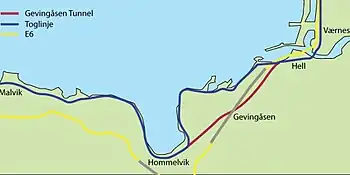
To the east of Malvik is the municipality of Stjørdal, which includes Trondheim Airport, Værnes. The airport has frequent connections to many locations in Norway, and a growing range of direct air links abroad (currently including London, Amsterdam, Copenhagen, Stockholm, and Prague). The proximity of this airport means that Malvik, though a small community in a relatively isolated location, has rather good transport connections very close at hand. The European route E6 highway runs through Malvik and it has several tunnels, the longest of which is the Hell Tunnel.
The Nordland Line runs from Trondheim to Bodø (further north in Norway) and the Meråker Line runs east to Sweden. The railroad winds its way along the coast of the Trondheimsfjord in Malvik, and is a very scenic and pleasant journey. Malvik has two railway stations: Vikhammer Station and Hommelvik Station. The Gevingåsen Tunnel is being built to shorten the rail trip from Trondheim to Stjørdal. A side effect of this is that the scenic attractiveness of the trip will be somewhat reduced, as part of the section along the fjord will no longer form part of the trip. The railway junction where the line splits for Bodø or Sweden is just to the east of Malvik, at a small settlement called Hell. The station is well known to railway enthusiasts from its odd name (for English language speakers). It is indeed possible, in Malvik, to purchase "a single ticket to Hell" or a return "to Hell and back".
Notable residents
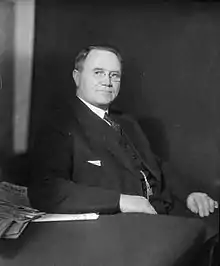
- Werner Hosewinckel Christie (1877 in Hommelvik – 1927) Norwegian agricultural researcher
- Johan Nygaardsvold (1879 in Hommelvik – 1952) Prime Minister of Norway 1935 to 1945
- Rut Tellefsen (born 1930 in Malvik) a Norwegian actress [35]
- Torgeir Moan (born 1944 in Malvik) a Norwegian engineer and professor of marine technology
- Mads Eriksen (born 1977 in Malvik) a Norwegian cartoonist
Sport
- Thomas Byberg (1916 in Hommelvik – 1998) a speed skater, silver medallist at the 1948 Winter Olympics
- Arne Herjuaune (1945 in Malvik – 2017) a speed skater, competed at the 1968 Winter Olympics
- Kristine Nøstmo (born 1993 in Malvik) a football goalkeeper, 165 caps with Rosenborg BK Kvinner
References
- "Navn på steder og personer: Innbyggjarnamn" (in Norwegian). Språkrådet.
- "Forskrift om målvedtak i kommunar og fylkeskommunar" (in Norwegian). Lovdata.no.
- Statistisk sentralbyrå (1 January 2017). "Urban settlements. Population and area, by municipality".
- Olsen Haugen, Morten, ed. (12 September 2017). "Vikhammer". Store norske leksikon (in Norwegian). Kunnskapsforlaget. Retrieved 22 March 2018.
- Statistisk sentralbyrå. "Table: 06913: Population 1 January and population changes during the calendar year (M)" (in Norwegian).
- Statistisk sentralbyrå. "09280: Area of land and fresh water (km²) (M)" (in Norwegian).
- Jukvam, Dag (1999). "Historisk oversikt over endringer i kommune- og fylkesinndelingen" (PDF) (in Norwegian). Statistisk sentralbyrå.
- Rygh, Oluf (1901). Norske gaardnavne: Søndre Trondhjems amt (in Norwegian) (14 ed.). Kristiania, Norge: W. C. Fabritius & sønners bogtrikkeri. p. 356.
- "Civic heraldry of Norway - Norske Kommunevåpen". Heraldry of the World. Retrieved 14 February 2023.
- "Malvik, South Trøndelag (Norway)". Flags of the World. Retrieved 14 February 2023.
- "Godkjenning av våpen og flagg". Lovdata.no (in Norwegian). Norges kommunal- og arbeidsdepartementet. 4 October 1982. Retrieved 14 February 2023.
- Statistics Norway"Table 1 Urban settlements. Population and area, by municipality. 1 January 2009". www.ssb.no.
- Jan S. Krogh. "Domestic enclaves/exclaves of Norway". Retrieved 11 March 2011.
- Hansen, Tore, ed. (12 May 2016). "kommunestyre". Store norske leksikon (in Norwegian). Kunnskapsforlaget. Retrieved 1 January 2019.
- "Tall for Norge: Kommunestyrevalg 2019 - Trøndelag". Valg Direktoratet. Retrieved 20 October 2019.
- "Table: 04813: Members of the local councils, by party/electoral list at the Municipal Council election (M)" (in Norwegian). Statistics Norway.
- "Tall for Norge: Kommunestyrevalg 2011 - Sør-Trøndelag". Valg Direktoratet. Retrieved 20 October 2019.
- "Kommunestyrevalget 1995" (PDF) (in Norwegian). Oslo-Kongsvinger: Statistisk sentralbyrå. 1996. Retrieved 23 June 2020.
- "Kommunestyrevalget 1991" (PDF) (in Norwegian). Oslo-Kongsvinger: Statistisk sentralbyrå. 1993. Retrieved 23 June 2020.
- "Kommunestyrevalget 1987" (PDF) (in Norwegian). Oslo-Kongsvinger: Statistisk sentralbyrå. 1988. Retrieved 23 June 2020.
- "Kommunestyrevalget 1983" (PDF) (in Norwegian). Oslo-Kongsvinger: Statistisk sentralbyrå. 1984. Retrieved 23 June 2020.
- "Kommunestyrevalget 1979" (PDF) (in Norwegian). Oslo: Statistisk sentralbyrå. 1979. Retrieved 23 June 2020.
- "Kommunevalgene 1975" (PDF) (in Norwegian). Oslo: Statistisk sentralbyrå. 1977. Retrieved 23 June 2020.
- "Kommunevalgene 1972" (PDF) (in Norwegian). Oslo: Statistisk sentralbyrå. 1973. Retrieved 23 June 2020.
- "Kommunevalgene 1967" (PDF) (in Norwegian). Oslo: Statistisk sentralbyrå. 1967. Retrieved 23 June 2020.
- "Kommunevalgene 1963" (PDF) (in Norwegian). Oslo: Statistisk sentralbyrå. 1964. Retrieved 23 June 2020.
- "Kommunevalgene og Ordførervalgene 1959" (PDF) (in Norwegian). Oslo: Statistisk sentralbyrå. 1960. Retrieved 23 June 2020.
- "Kommunevalgene og Ordførervalgene 1955" (PDF) (in Norwegian). Oslo: Statistisk sentralbyrå. 1957. Retrieved 23 June 2020.
- "Kommunevalgene og Ordførervalgene 1951" (PDF) (in Norwegian). Oslo: Statistisk sentralbyrå. 1952. Retrieved 23 June 2020.
- "Kommunevalgene og Ordførervalgene 1947" (PDF) (in Norwegian). Oslo: Statistisk sentralbyrå. 1948. Retrieved 23 June 2020.
- "Kommunevalgene og Ordførervalgene 1945" (PDF) (in Norwegian). Oslo: Statistisk sentralbyrå. 1947. Retrieved 23 June 2020.
- "Kommunevalgene og Ordførervalgene 1937" (PDF) (in Norwegian). Oslo: Statistisk sentralbyrå. 1938. Retrieved 23 June 2020.
- "Ordførere i Malvik". Malvik-Bladet (in Norwegian). 23 September 2015. p. 5.
- Forbord, Kåre (1993). Malvik bygdebok (in Norwegian). Vol. 5. Malvik kommune. ISBN 9788291387024.
- IMDb Database retrieved 05 November 2020
External links
 Media related to Malvik at Wikimedia Commons
Media related to Malvik at Wikimedia Commons Trøndelag travel guide from Wikivoyage
Trøndelag travel guide from Wikivoyage- Municipal Homepage (in Norwegian)
- Municipal fact sheet from Statistics Norway (in Norwegian)
